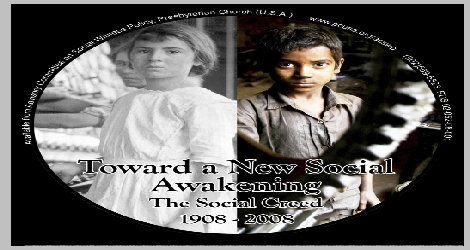 View article in PDF (optimal for printing)
View article in PDF (optimal for printing)
[wpcol_1half id=”” class=”” style=””]
“For Workers” was first published in 2008 as part of a book of essays written in response to themes raised by A Social Creed for the 21st Century. As you read this essay, you may be interested in observing just how much has changed since 2008. Let me offer just a few examples. Minimum wages and federal poverty guidelines are slightly higher, but other economic conditions and disparities in income and wealth have worsened. In December 2008, unemployment statistics reached 11.1 million or about 7.2%; the unemployment rate hovered around 9% nationwide in July 2011. 2008 and 2009 are both remembered as record-breaking years for foreclosure rates (nearly 3 million foreclosures in 2009 alone). The U.S. was ranked 39th in distribution of family income in 2007 when compared with other countries around the world;[1] we maintained our place as the country with the highest level of income inequality in the so-called “developed” world.
Today, the richest 1% of the U.S. population owns about 50% of all wealth. Michael Norton, Harvard Business School, and Dan Ariely, Duke University,[2] recently conducted an online survey about the perception of U.S. citizens on wealth distribution. Norton and Ariely concluded that the average citizen “dramatically underestimates” our current wealth and income disparities in the U.S.
[/wpcol_1half] [wpcol_1half_end id=”” class=”” style=””]
In other words, most people in our country are failing to deal with the reality of economic inequality. The only people who did not underestimate wealth and income disparities were people surveyed who fell in lower income brackets. There is a clear and urgent need to envision serious and sustainable alternatives and to enact policies that will promote a more equal distribution of wealth and income.
Several important statements have been made by ecumenical groups such as the Social Creed (N.C.C.), the Accra Confession (W.C.R.C.), and the A.G.A.P.E. document (W.C.C.) that continue to be worthy of our attention. I hope that will you revisit these statements as you consider the needs of workers today. These ecumenical statements invite us to come to grips with the role we have played in creating disparities in income and wealth in our own nation and around the world. More importantly, these confessions reflect the way in which people of faith are embracing the message of hope born from our own faith tradition.
[/wpcol_1half_end]





Unbound Social